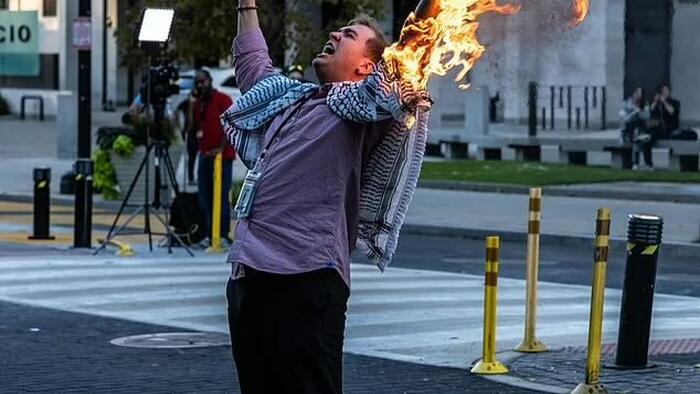The incident involving Samuel Mena Jr., a photojournalist from Phoenix, Arizona, has drawn significant attention following a shocking act of self-immolation during a pro-Palestinian rally near the White House. Mena, reportedly claiming to be affiliated with KPHO CBS 5 News and PBS, set his left arm on fire while exclaiming, “I am a journalist. We spread the misinformation!” This incident, occurring against the backdrop of ongoing geopolitical tensions surrounding the Israel-Hamas conflict, raises critical questions about the role of journalists, the nature of media coverage, and personal desperation manifesting in extreme actions. The situation has been further complicated by CBS News’s clarification that Mena is not connected with any CBS-owned entities, challenging the authenticity of his claims and further muddling the narrative.
Leading up to this tragic event, Mena had engagingly expressed his frustration concerning media narratives surrounding the Gaza conflict. Just moments before his act, Mena posted an emotionally charged message on his blog. In this message, he dedicated his left arm to the children in Gaza who had suffered unimaginable losses due to the ongoing conflict. His intention was poignant: to raise awareness and perhaps galvanize action for the plight of those affected by war. This desire to connect and empathize with victims is understandable but highlights the broader issues faced by journalists trying to navigate their moral responsibilities in a landscape heavy with misinformation and sensationalism.
Mena’s fiery protest against what he perceives as biased US media coverage of Israel’s actions in Gaza underscores the polarizing nature of media portrayal in times of conflict. Many individuals and communities feel misrepresented or ignored in mainstream narratives, which can incite extreme emotional responses, as witnessed in Mena’s case. His self-immolation, a rare and extreme form of protest, reflects deep despair and disillusionment with media practices—particularly in relation to humanitarian issues. Yet, it also raises the question of accountability in journalism and how personal beliefs may intersect with professional responsibilities.
In the aftermath of Mena’s protest, social media platforms became alive with reactions and analyses. Users noted the irony of his statement about spreading misinformation, especially as he appeared to voice disdain for platforms designed to foster free speech and dialogue. This duality presents a complex picture of modern journalism, where journalists can feel overwhelmed by the narratives they are tasked with promoting or debunking. The conflict surrounding the Israel-Gaza war has ignited passionate responses worldwide, and Mena’s actions serve as a powerful reminder of the emotional stakes involved in reporting on such issues. His statements suggest an internal conflict regarding the impact of his profession in shaping public perception and discourse.
Furthermore, Mena’s previous presence near former President Trump during a press event raises concerns about mental health and the well-being of individuals in fast-paced, high-stakes environments that journalism often entails. The pressures of working in an industry described by some as undergoing a crisis of credibility may drive individuals to troubling extremes. It also serves as a prompt for organizations to scrutinize their support systems and mental health resources for journalists who may be struggling with the ethical implications of their work or the emotional weight of the stories they cover.
Ultimately, the tragic event involving Samuel Mena Jr. serves not only as a haunting reminder of the personal toll of journalistic work but also as a call for reflection on the state of media in today’s world. It challenges both the media industry and society to confront the responsibilities that come with reporting on sensitive topics. The capacity for compassion within journalism should be balanced with ethical reporting principles, particularly when discussing conflicts that lead to immense suffering. As the discussions around misinformation, media bias, and representation intensify, Mena’s actions underscore the need for thoughtful engagement with the narratives we consume and the impact they have on those within and outside the journalistic profession.

